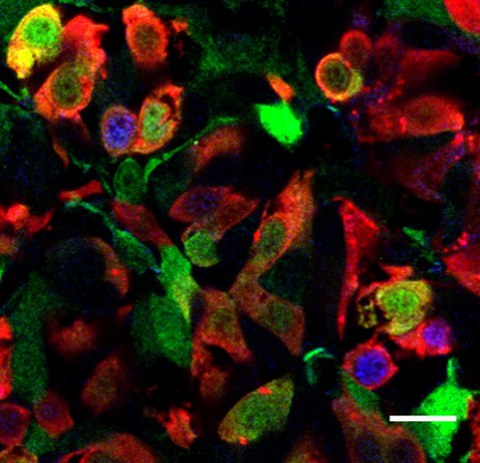Apr 20, 2018
An inflammatory clock for the age-associated decline in the renewal of insulin-producing cells
The pancreas islet, a cellular community that hosts the insulin-producing beta cells, is known to undergo age-related changes. In particular, aging is associated with a reduction in the renewal capacity of beta-cells and type 2 diabetes is an age-related disease. However, only a handful of signals have been identified in connection with ageing. By comparing beta cells from younger and older zebrafish, Sharan Janjuha and Sumeet Pal Singh (Ninov group) were able to show that the aging islets show signs of chronic inflammation. These include recruitment of macrophages that express the cytokine TNFα and the activation of NF-kB signaling in beta cells. Interestingly, the activation of NF-kB (a specific transcription factor found in virtually all animal cell types and tissues) is not uniform but heterogeneously distributed across the beta-cell population, meaning that different beta-cells exhibit different levels of inflammation with age. Those beta-cells that activate NF-kB signaling at higher levels also upregulate prematurely a gene that inhibits their proliferation. Organ renewal is preferentially maintained by a subpopulation of beta-cells that escape the age-related activation of NF-kB signaling. Altogether, the results document the development of chronic islet inflammation in older animals, with high levels of NF-kB signaling marking the cells that lose proliferative potential with age.
The study identified tissue-infiltrating immune cells as a potential source of age-related inflammation. "In the future, we plan to understand the specific signals that the immune cells release, which will help define their role in regulating islet inflammation. Furthermore, we plan to test whether pharmacological and genetic NF-kB signaling inhibition (inactivation of its components) can rejuvenate the aging islet in order to increase beta-cell renewal. Finally, some of our new preliminary data indicate that having high levels of NF-kB signaling might confer a particular advantage to the beta-cells under specific conditions. We are exploring this unknown aspect because the knowledge could help improve current strategies for islet isolation and engraftment for diabetes-treatment", explains Nikolay Ninov.
Picture: A section through a zebrafish pancreatic islet showing insulin-positive cells in red, NF-kB activity in green and proliferating cells in blue. Arrowheads point to proliferating beta-cells with lower levels of NF-kB activity. Publication: "Age-related Islet Inflammation Marks the Proliferative Decline of Pancreatic Beta-cells in Zebrafish"
Publication: "Age-related Islet Inflammation Marks the Proliferative Decline of Pancreatic Beta-cells in Zebrafish"

